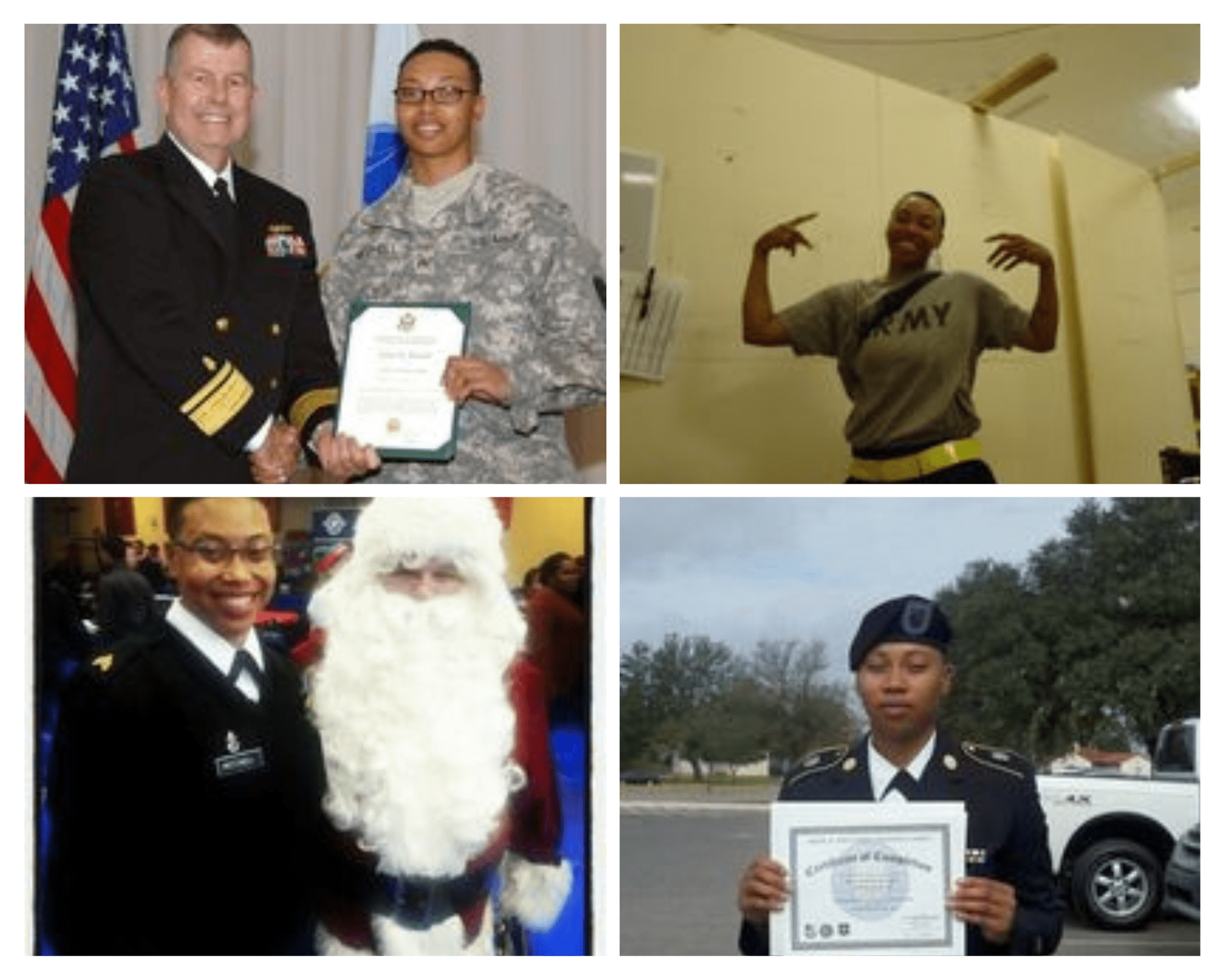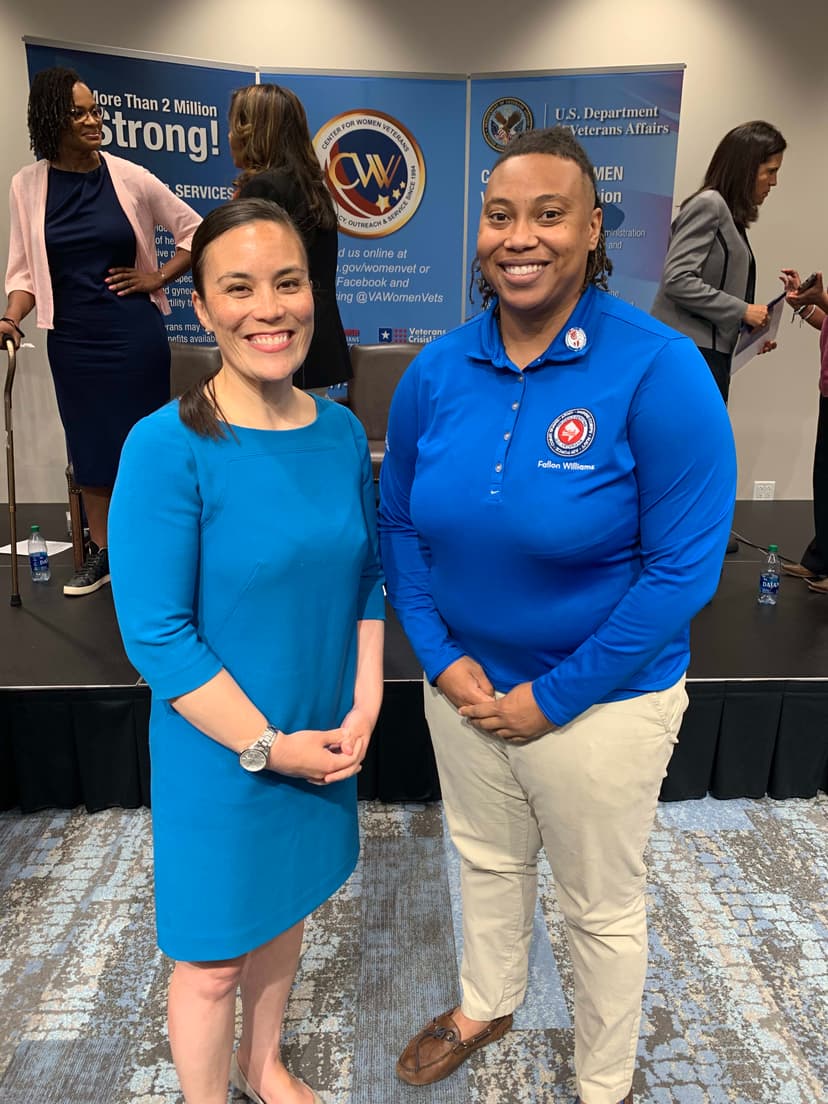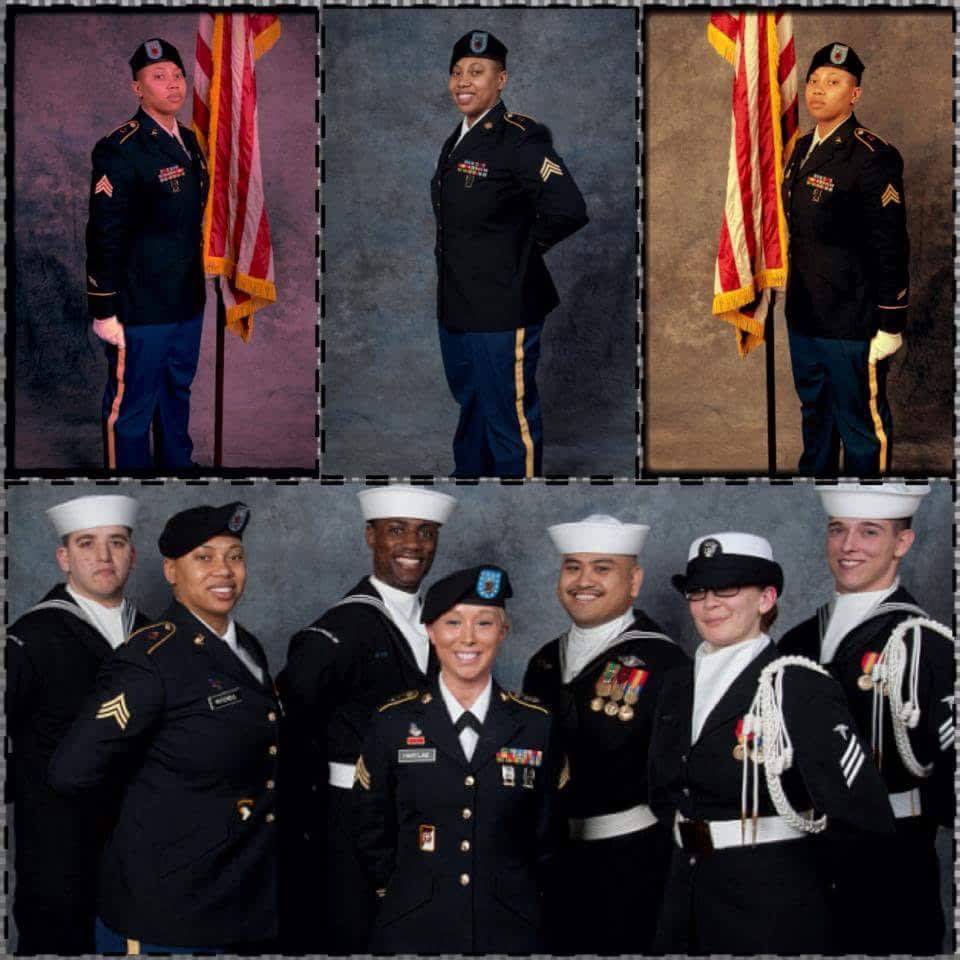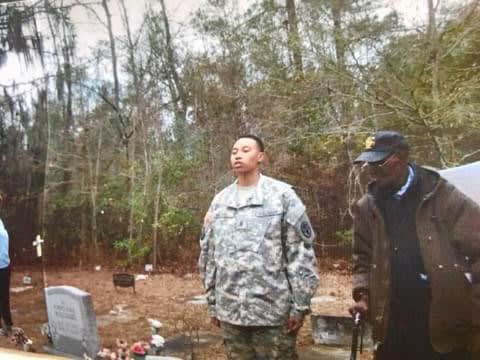DC resident Fallon Williams spent her formative years in the military, serving for five years in the Army National Guard, followed by 10 years on active duty in the Army.
Still driven to serve after separation, Williams decided to build a career as an advocate for other veterans. She began working at Friendship Place, where she assisted housing-insecure veterans with wrap-around services and implemented the Housing First Model. She also worked closely with Arcadia Mobile Market to provide local, affordable produce to DC.-based individuals.
Williams then landed an opportunity to serve veterans who are specifically LGBTQ+, and she found her calling. She joined the Washington, D.C. Mayor’s Office as the first LGBTQ+ Veteran Liaison, the first of its position for the District, and one of only four in the country. She currently serves as a Veteran Service Officer for the Mayor’s Office of Veterans Affairs in the District of Columbia, helping other local veterans navigate the VA, file claims, and access the benefits they rightfully earned.
We interviewed Williams to learn about her time serving as a Black LGBTQ+ woman in the military and how she finds meaning in serving DCs veterans in a different way.
MaCherie Dunbar: When did you move to DC?
Fallon Williams: In 2012, I was still serving in the Army and at the hospital formerly known as Walter Reed Medical Center, presently known as Washington Naval Medical Center. I was there right before the integration of other branches.
MD: That wasn’t long after the repeal of Don’t Ask, Don’t Tell. Did you feel liberated and like you could shout from the rafters that you were gay, or was it a slow transition?
FW: It was a slower transition because, just like when the military was integrated, you still had people who had their own sayings and feelings about it. I was afraid that a lot of that would come down on me too.

Photos courtesy of Fallon Williams
MD: How was your experience serving during Don’t Ask, Don’t Tell?
FW: It was hard. I was a robot and felt like I always had to live a double life. And you really had to figure out how to hide who you were as a person.
MD: Were you able to find some people you could feel safe and in community with?
FW: Honestly, I’ve always found community in churches, and I found one in Baltimore at the time.
MD: Wow. In our community, being queer as a Black person is not inherently accepted, so the fact that you could find that in a church is incredible.
FW: Yeah, it was rare.
MD: Shout-out to the church in Baltimore. Did you have allies while you were serving or during your transition that really affected things positively for you and helped you have a stronger outlook?
FW: I had a commander and a lieutenant commander — one Black and one Asian — both from the public health services that really taught me how to take care of myself.
They made me realize that as a Black queer woman, there are certain things I was going to have to deal with, but I can still navigate them with the assistance of others.

Williams meeting Gina Ortiz Jones — a queer woman, veteran, and former Under Secretary of the Air Force
MD: I’m glad you had people who were in community with you, who were also reaching out and guiding and supporting and offering that mentorship, because that’s a critical component to our success; seeing people above us who figured it out and were able to make it themselves.
Since leaving the military, have you felt comfortable being out, especially in Washington, D.C., or was that a bit of a transition for you?
FW: I felt comfortable because I wasn’t afraid anything was going to happen to me. But there’s been plenty of times I’m kind of afraid, especially when I go back to my hometown in Georgia, where it’s very conservative.
I remember having a trans flag in the back of my truck, and I thought, maybe I should put that up while I’m here. You know, it’s different in Georgia.
MD: The Deep South is going to be different for sure. In DC, there’s certainly community as far as being Black and queer. Do you think your previous position as the LGBTQ+ liaison to the military/veteran community contributed to you being able to have community at the intersection of the three?
FW: It allowed me to be more established, but it also helped me see the reality of what being a Black veteran meant.
You see the still-existing injustices and inadequacies in treatment. And even in the LGBTQ+ community, as a Black individual, you are still treated differently.
MD: And then when you add veteran in the Black queer community, we’re even more hidden. It’s hard to find those of us that have all three paired together.
FW: It’s hard to find those who are open and willing to say it.
MD: Can you speak to any challenges while serving in that position, as one of the few people focused on ensuring that the Black community was considered when it came to being queer and being a veteran?
FW: One of my greatest challenges was realizing that these discriminations were still going on in the years that I was serving as the first LGBTQ+ Veteran Coordinator in Washington, D.C.
As a Black, female, queer individual, I had to navigate it, not only personally, but also professionally.

Photos courtesy of Fallon Williams
MD: Do you feel like you had strong enough allies to carry out your mission effectively and really make sure all the groups were represented and accounted for?
FW: I felt as though this was a brand-new position for DC, and I had enough support, but it’s like trying to climb a mountain top.There are additional tools and resources you’ll need along the way.
MD: What has been one of your greatest successes in your advocacy work?
FW: I felt one of my greatest successes was hearing from another veteran that the ability to move to Washington, D.C. was a lot easier knowing that I served and I was in that position.
MD: You have since changed positions and are now working as a veteran service officer, still within the Mayor’s Office of Veterans Affairs. Do you have any regret about leaving the position of LGBTQ+ liaison?
FW: I feel as though I can be of more service as a veteran service officer. You run into so many people who have been like, “I haven’t been heard in my claim.” Or “I don’t get the same treatment.”
So I miss it in some ways, but I’m glad I can do more on the federal claims side of things.
MD: I did a little bit of that work myself and can agree. I’m glad we have you over there. Shifting gears, how do you feel about the constant changes and threats in relation to federal policy that are currently happening?
FW: Right now, our trans sisters and brothers are really going through it. They’re serving and should have the same rights as everyone else. I’m just really tuned into our trans community and how I can be more supportive to them right now.
MD: Do you have any advice for anyone who is Black and queer and considering joining the military?
FW: My advice would be that yes, the military has certain guidelines, but people will come trying to uphold some of the roots that they have where you’re facing racism and other types of discrimination. Your Blackness is not a penalty. Stay in your truth.

Williams with her beloved grandfather
MD: Given all the work you’ve done, your own transition from service and everything you’re seeing today, what would be your best advice for anyone who is Black and queer and transitioning from service?
FW: Find your community. Find your people. Know that there are resources out there to support you on your journey. If anyone needs anything, a claim or support, I’m here as a resource.
MD: Given the political landscape, what would you say to those who are Black and queer and considering staying in the military?
FW: At the end of the day, do what you need to do to take care of yourself. Keep on pushing and moving forward. But also know there will be a day that you’ll have to get out, so be ready for the transition.
MD: If you could do it all over again, would you and why?
FW: If I could do it all over again, I still would. I feel as though my service was something that I did in honor of my grandfather, and it was, in truth, to myself as much as I could be at the time.
This interview was conducted by MaCherie Dunbar, special issue co-editor and guest contributor, an award-winning advocate, and Black queer veteran residing in Washington, D.C. Make sure to read her personal story in this issue.













